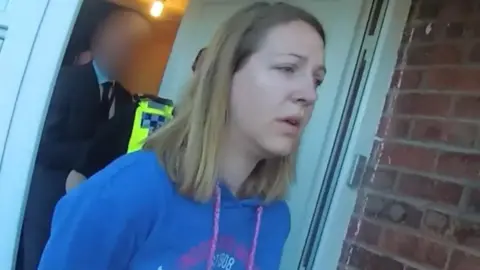'Chances missed' for NHS scrutiny at Letby hospital
 PA Media
PA MediaSeveral chances were missed to ask more questions about patient safety at the hospital where Lucy Letby was attacking and killing babies, an NHS executive has told the public inquiry into the neonatal nurse's crimes.
While Letby murdered seven babies and attempted to murder seven others between June 2015 and June 2016, only three "serious incidents" were flagged by Countess of Chester Hospital bosses to NHS England.
Professor Sir Stephen Powis, national medical director for NHS England, also said his organisation was not aware of any suspicions around Letby until March 2017.
Letby, now 35, is serving 15 whole-life orders.
'Serious incidents'
The inquiry heard Letby, originally of Hereford, was reassigned from her neonatal unit at the Countess of Chester Hospital to non-clinical duties in June 2016.
After the unexpected deaths on successive days of two triplet boys, consultant paediatricians told their bosses at the hospital that they feared Letby may be deliberately harming babies.
While independent reviews into the increased mortality rate were commissioned by the hospital's executives, Cheshire Police were not brought in until May 2017.
NHS England says its purpose is "to lead the NHS in England to deliver high-quality services for all".
National medical director Sir Stephen said that between June 2015 and June 2016, some 16 incidents had been reported to its system before Letby was removed from clinicial duties.
"Only three of them, one at the very start of that period and two right at the end," he said, "were reported through our 'serious incident' process - in other words were declared as 'serious incidents'.
"If more had been declared, then there would have undoubtedly been more scrutiny... it would have led to more questions, to more curiosity.
"Then, afterwards, if we had known that there was concerns around an individual we would have undoubtedly have required the police to be involved at an earlier point."
'Triggered concerns'
Letby administered fatal injections of air to three babies within a two-week period in June 2015, but only one of the deaths was referred to NHS England, the inquiry heard.
Sir Stephen said he would have expected all three to have been declared as "serious incidents".
He said: "The fact only one was reported meant that it did not trigger the concerns that a cluster of reports would have.
"A year later, when [the deaths of two other babies] were reported in a very short timespan that immediately triggered concerns among [NHS England] commissioners to scrutinise further and to seek further information.
"So if those in that initial cluster had been referred as a 'serious incident' report, I am confident it would have triggered the same level of inquiry and curiosity from commissioners."
Sir Stephen added: "From the evidence I have seen, even with that first cluster of deaths, concerns around a particular member of staff were raised."
 PA Media
PA MediaHe acknowledged NHS England "possibly could have asked more questions" about the findings of an independent review that had been launched in September 2016 by the Royal College of Paediatrics and Child Health into the increased mortality rate at the Countess of Chester's neonatal unit.
Sir Stephen said: "As it got towards the end of 2016, colleagues at NHS England and its legacy bodies were becoming more frustrated, more concerned, about the openness and the transparency of what was occurring at the Countess of Chester.
"We were not aware that there was suspicion around a particular member of staff until March 2017 and at that point it was our view the correct thing to do would be to involve the police."
Counsel to the inquiry Rachel Langdale KC asked: "What do you think might have made that difficult to express those concerns about a member of staff - whether you are a doctor or manager?"
Sir Stephen said: "I think there are three things relevant here.
"One is the culture within an organisation, that culture of curiosity and openness.
"Clearly... curiosity to an extent was not shared with all members of the leadership team within the Countess of Chester."
He also said "processes and systems in place to allow escalation... were not used in a way they should have been".
"Finally, you need to be aware of the possibility - however rare, however infrequently - that a healthcare professional could deliberately cause harm," he added.
The inquiry will reconvene at Liverpool Town Hall on 17 March for closing submissions, and findings by chairwoman Lady Justice Thirlwall are expected to be published this autumn.
Additional reporting by PA Media.
Listen to the best of BBC Radio Merseyside on BBC Sounds and follow BBC Merseyside on Facebook, X, and Instagram, and watch BBC North West Tonight on BBC iPlayer.
